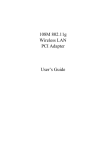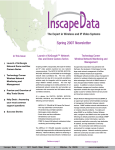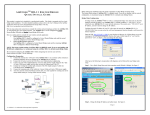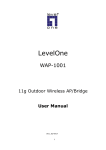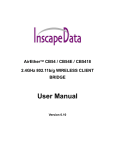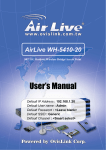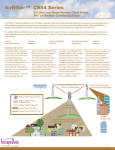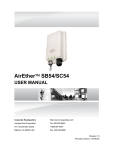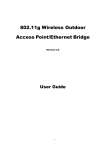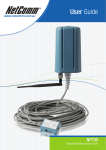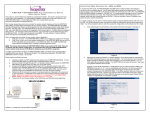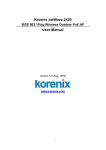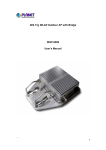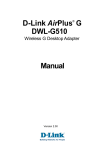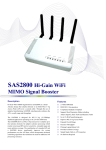Download User Manual - Inscape Data
Transcript
AirEther™ AB54 / AB54E /AB54E PRO 2.4GHz 802.11b/g WIRELESS ACCESS POINT / BRIDGE / REPEATER / CLIENT User Manual Version 1.2.1 July 11, 2006 AirEther™ AB54 2.4GHz Access Point/Wireless Bridge/Wireless Repeater FCC Notice NOTE: This equipment has been tested and found to comply with the limits for a Class B digital device, pursuant to part 15 of the FCC Rules. These limits are designed to provide reasonable protection against harmful interference in a residential installation. This equipment generates, uses and can radiate radio frequency energy and, if not installed and used in accordance with the instructions, may cause harmful interference to radio communications. However, there is no guarantee that interference will not occur in a particular installation. If this equipment does cause harmful interference to radio or television reception, which can be determined by turning the equipment off and on, the user is encouraged to try to correct the interference by one or more of the following measures: • Reorient or relocate the receiving antenna. • Increase the separation between the equipment and receiver. • Connect the equipment into an outlet on a circuit different from that to which the receiver is connected. • Consult the dealer or an experienced radio / TV technician for help. Changes or modifications not expressly approved by the party responsible for compliance could void the user’s authority to operate the equipment. The antenna(s) used for this transmitter must not be co-located or operating in conjunction with any other antenna or transmitter. The manufacturer is not responsible for any radio or TV interference caused by unauthorized modifications to this equipment. Such modifications could void the user’s authority to operate the equipment. 2 AirEther™ AB54 2.4GHz Access Point/Wireless Bridge/Wireless Repeater Table of Contents 1 2 INSTALLATION CONSIDERATIONS .............................................................................. 5 1.1 NETWORK TOPOLOGY – ACCESS POINT MODE ................................................................ 6 1.2 NETWORK TOPOLOGY – REPEATER MODE ....................................................................... 7 1.3 NETWORK TOPOLOGY – WIRELESS BRIDGE (WDS) POINT TO MULTI-POINT MODE ....... 8 1.4 INSTALLATION DIAGRAM .................................................................................................. 9 EQUIPMENT CONFIGURATION USING LOCATOR UTILITY SOFTWARE ........ 11 2.1 3 4 EQUIPMENT CONFIGURATION USING WEB USER INTERFACE ........................................ 11 2.1.1 Before Setup ........................................................................................................... 11 2.1.2 Initial configuration of the equipment using a Web Browser ................................. 12 2.1.3 Initial configuration of the equipment using the Locator Utility ........................... 12 WIRELESS CONFIGURATION - AP MODE.................................................................. 13 3.1 SYSTEM STATUS – .......................................................................................................... 13 3.2 SYSTEM CONFIGURATION –............................................................................................ 16 3.3 ADMINISTRATION – ........................................................................................................ 17 3.4 IP SETTINGS –................................................................................................................. 18 3.5 WIRELESS NETWORK - ................................................................................................... 19 3.6 WIRELESS SECURITY -.................................................................................................... 20 3.7 ADVANCED WIRELESS SETTINGS - ................................................................................. 24 3.8 MAC FILTERING ............................................................................................................. 26 3.9 BACKUP/RESTORE SETTING / FIRMWARE UPGRADE AND REBOOT -.............................. 27 WIRELESS CONFIGURATION – WIRELESS BRIDGE MODE (POINT TO POINT & POINT TO MULTI-POINT)....................................................................................................... 30 4.1 CONSIDERATIONS BEFORE INSTALLATION – ................................................................... 30 4.2 BRIDGE SECURITY SETTINGS–..................................................................................... 31 5 WIRELESS CONFIGURATION – WIRELESS REPEATER MODE........................... 32 6 WIRELESS CONFIGURATION – WIRELESS CLIENT BRIDGE CONFIGURATION 35 6.1 CONNECTION STATUS – .................................................................................................. 36 6.2 WIRELESS NETWORK - ................................................................................................... 37 6.3 WIRELESS SECURITY – ................................................................................................... 39 6.4 ETHERNET CLIENT LIST –............................................................................................... 41 3 AirEther™ AB54 2.4GHz Access Point/Wireless Bridge/Wireless Repeater 7 APPENDIX A: GLOSSARY ............................................................................................... 42 8 APPENDIX B: SPECIFICATION...................................................................................... 45 9 APPENDIX C: AB54 SERIES PACKAGE CONTENTS ……………………………….47 4 AirEther™ AB54 2.4GHz Access Point/Wireless Bridge/Wireless Repeater 1 Installation Considerations The AP lets you access your network, using a wireless connection, from virtually anywhere within its operating range. Keep in mind, however, that the number, thickness and location of walls, ceilings, or other objects that the wireless signals must pass through, may limit the range. Typical ranges vary depending on the types of materials and background RF (radio frequency) noise in your home or business. The key to maximizing wireless range is to follow these basic guidelines: z Keep your product away (at least 3-6 feet or 1-2 meters) from electrical devices or appliances that generate RF noise. z Keep the number of walls and ceilings between the AP and other network devices to a minimum - each wall or ceiling can reduce your AP’s range from 3-90 feet (1-30 meters.) Position your devices so that the number of walls or ceilings is minimized. z Be aware of the direct line between network devices. A wall that is 1.5 feet thick(0.5 meters), at a 45-degree angle appears to be almost 3 feet (1 meter) thick. At a 2-degree angle it looks over 42 feet (14 meters) thick! Position devices so that the signal will travel straight through a wall or ceiling (instead of at an angle) for better reception. z Building materials can impede the wireless signal - a solid metal door or aluminum studs may have a negative effect on range. Try to position wireless devices and computers with wireless adapters so that the signal passes through drywall or open doorways and not other materials. 5 AirEther™ AB54 2.4GHz Access Point/Wireless Bridge/Wireless Repeater 1.1 Network Topology – Access Point Mode The diagram above is shown with an AirEther AB54E combined with external wide radiation pattern antenna ( i.e. AirEther OA12 or AirEther SA1218 sector antenna). achieve point to multipoint expanded wide area coverage . This setup can For cost effective sectorized mobile or fixed wireless coverage area, use the AirEther AB54 with integrated 12 dBi antenna. 6 AirEther™ AB54 2.4GHz Access Point/Wireless Bridge/Wireless Repeater 1.2 Network Topology – Repeater Mode The AirEther AB54 or AB54E in the repeater mode extends AB54 series equipment and other 802.11 b/g Access Point’s coverage area to service hard to reach wireless clients. This is convenient if a wired distribution system is not feasible. To retian the quality of service and broadband internet experience of the wireless coverage area, do not extend a repeater system beyond 2 to 3 hops. The table reference below indicates few manufacturer’s access point compatibility uncertainty due to propriety. It is recommended to use AB54 series AP to ensure full compatibility. Make P/N 802.11 Chipset Compatible Broadcom BCM94704-GAP b/g Broadcom Yes Cisco 1231G b/g No Conexant ISL3900A a/b/g Conexant No D-Link DWL-2100AP b/g Atheros No Linksys WAP54G b/g Broadcom Yes Proxim AP600 b/g Atheros No 7 AirEther™ AB54 2.4GHz Access Point/Wireless Bridge/Wireless Repeater 1.3 Network Topology – Wireless Bridge Point to Multi-Point Mode The AirEther AB54 or AB54E in the wireless bridge mode provides two functionality, point to point or point to multipoint layer 2 bridge. Each AB54 has packet fowarding capability to provide AP to AP communication. Inscape Data bridges may span across multiple hops to span across buildings, campus, and cities. For high capacity bridge, please see the AirEther BR108 for optimal backhaul performance up to 108mbps data rate. The X mark on the above topology diagram is an example of what not to do using the bridge mode. Creating a bridge loop will cause instability in the bridge system. 8 AirEther™ AB54 2.4GHz Access Point/Wireless Bridge/Wireless Repeater 1.4 Installation Diagram (AB54E and AB54E Pro Shown Below) 9 AirEther™ AB54 2.4GHz Access Point/Wireless Bridge/Wireless Repeater AB54E PRO hardware installation diagram Attention: z The cable distance between the AB54/E and the Router, Switch, or PC should not exceed 100 meters, the Ethernet cable limitation. z In 10Mbps operation, Category 3/4/5 cable can be used for the cable connection. To reliably operate your network at 100Mbps, you must use Category 5, or better data grade cables. 10 AirEther™ AB54 2.4GHz Access Point/Wireless Bridge/Wireless Repeater 2 Equipment Configuration Using Locator Utility Software The locator utility software will automatically search for available AB54 series or CB54 series equipment on the same network. The results displayed by the locator are the following: the Device Name, Device Type, IP Address, Ethernet MAC Address and Firmware Version in first page. Before initiating the Locator utility, make sure you disable personal firewall installed in your PC. (Ex. Windows XP personal firewall) If you have 2 Fast Ethernet Adapter or more, you can choose enable on one of the Fast Ethernet Adapter. 2.1 Equipment Configuration Using Web User Interface 2.1.1 Before Setup Verify the IP address setting You need to configure your PC’s network settings to obtain an IP address. Computer use IP addresses to communicate with each other across a network, such as the Internet. following is a brief instruction for Windows based PC system. The For other operating system, please follow its respective user manual. 1. From the taskbar, click the Start button, select Settings > Control Panel. From there, double-click the Network connections icon. 2. Right click the Local Area Connection icon Properties; select the TCP/IP line for the applicable Ethernet adapter. Then, click the Properties button. 3. Click the IP Address tab page, select USE the following IP address, type 192.168.1.100 in the IP Address field and 255.255.255.0 in the Subnet Mask field, then click OK button. Attention: Use the IP addresses in this section as an example only. The goal is to configure your PC to be in the same sub-network as the equipment you are configuring. Please consult a network administrator if there are any questions on setting up a PC’s IP address. 11 AirEther™ AB54 2.4GHz Access Point/Wireless Bridge/Wireless Repeater 2.1.2 1. Initial configuration of the equipment using a Web Browser After a network connection is established, start the web browser (make sure you disable the proxy) and type 192.168.1.20 in the Address field. Press Enter. 2. Enter the factory default User name and Password fields: User Name: Admin Password: (leave blank) Then click OK button. 3. 2.1.3 You will enter the Utility homepage. Initial configuration of the equipment using the Locator Utility 1. Click on the “Web” icon in Locator main page. The Locator will launch a default browser for you and lead you into web UI directly 12 AirEther™ AB54 2.4GHz Access Point/Wireless Bridge/Wireless Repeater 3 Wireless Configuration - AP Mode 3.1 System Status – The first page appears in main page will show “System Status -> System Summary” automatically, you can find detail system configuration in this page including z System Information – This will display system name and both Ethernet MAC address and Wireless MAC address. Current country setting and firmware version will also be available here. z Current IP Settings – This section show current IP address setting including IP address, Subnet Mask, Default Gateway and DHCP status. z Current Wireless Settings – This area show current wireless setting including operation mode, wireless mode, SSID, channel and security setting. 13 AirEther™ AB54 2.4GHz Access Point/Wireless Bridge/Wireless Repeater The first page will display “System Status -> Wireless Station List” automatically, this page can help user identify current devices that already associated to the AP. You can also click on the MAC address column then the system will show the detailed technical information for each wireless station. Clicking MAC address hyperlink of desired wireless devices will show a Statistics page for the wireless device. Values on this page are automatically refreshed every minute. You may manually press the refresh button of browser to get the updated data more frequent. As RF signal strength is more critical for outdoor deployment purpose, RSSI bar is refreshed every 2 seconds. Note: Due to frequent refresh of Statistics page, it is strongly recommended that you close this page when performing network performance tests. 14 AirEther™ AB54 2.4GHz Access Point/Wireless Bridge/Wireless Repeater Field RSSI Description Displays the strength of the received signal in dBm (the remote devices received signal strength). Refresh every 2 seconds. RSSI of ACK Displays the strength of the ACK signal from far end in dBm (the local devices received signal strength). Refresh every 2 seconds. MSDU Maximum Service Data Unit. Displays the number of packets sent and received by the remote devices. Data / Management / Packets can be data, management or control. Displays the Control number of packets sent and received for each. Multicast Displays the number of multicast frames. Data Rate Displays the receive and transmit data rate in Mbps. Receive Errors Displays the number of receive errors. Discarded Frames Displays the number of receive discarded frames. Duplicate Frames Displays the number of receive duplicate frames. CRC Errors Displays the number of receive CRC errors. Decrypt Errors Displays the number of receive description errors. PHY Errors Displays the number of receive PHY errors. DMA Errors Displays the number of receive DMA errors. Transmit Errors Displays the number of transmit errors. Discarded Frames Displays the number of transmit discarded frames. Excessive Retries Displays the number of transmit excessive retries. DMA Errors Displays the number of transmit DMA errors. 15 AirEther™ AB54 2.4GHz Access Point/Wireless Bridge/Wireless Repeater The page below describes the detail connection information with each station. You can get all information needed right here. 3.2 System Configuration – Now you can start to configure the system. In System Properties page, you can configure the following features: z Device Name – You may assign any name to the Access Point. Unique names are helpful especially if you are employing multiple access points on the same network. The device name needs to be less than 32 characters. Click “Apply” to save the setting. z Country/Region – Here you can set the AP to follow different country and region regulation. z Operation Mode - The default operation mode is Access Point, this connects your wireless PCs and devices to a wired network. In most cases, no change is necessary. You can switch operation mode to Repeater, Bridge, or wireless client mode depending on your application. In the repeater mode, one remote access point’s communication may be 16 AirEther™ AB54 2.4GHz Access Point/Wireless Bridge/Wireless Repeater retransmitted within its range. Choose repeater mode if you want to extend the range of your original AP. Wireless Bridge (WDS) can allow point to point or point to multi-point layer 2 bridge. In order to establish the wireless link between bridge radios, the MAC address of remotes bridge(s) need to be registered in the address table. Type the MAC address with format xx:xx:xx:xx:xx:xx (x is the hexadecimal digit) and use “Add” and “Delete” button to edit the address table. A Master Bridge Radio may accommodate up to 8 remote MAC addresses. In the wireless client mode, the unit may bridge up to 16 Ethernet clients onto the wireless network. 3.3 Administration – In the administration page, you can modify “Administrator Name” and “Password”. Changing the sign-on user name and password is as easy as typing the string you wish in the column. Then, type the password into second column to confirm. Click “Apply” to finish the procedure. Be sure to note the modification before apply all changes. 17 AirEther™ AB54 2.4GHz Access Point/Wireless Bridge/Wireless Repeater 3.4 IP Settings – IP Setting page allows configuration of the AB54’s system IP address. Default IP address is 192.168.1.20 and Subnet Mask is 255.255.0.0. You can manually input IP address setting or get an IP from a DHCP server. z IP Network Setting – Here you can choose to get IP from a DHCP server or specify IP address manually. Choose to obtain an IP address from DHCP server if your environment or ISP provide DHCP server. Otherwise, you can manually setup IP address. z IP Address – The IP address need to be unique to your network. The default IP network of 192.168.x.x. or 10.x.x.x may work well in your environment. z IP Subnet Mask – The Subnet Mask may be the same as your Ethernet network. Please consult a network specialist for recommendations. z Default Gateway – If you have assigned a static IP address to the Access Point, then enter the IP address of your network’s Gateway, such as a router, in the Gateway field. If your network does not have a Gateway, then leave this field blank. 18 AirEther™ AB54 2.4GHz Access Point/Wireless Bridge/Wireless Repeater 3.5 Wireless Network - The Wireless Network page allows you to set “SSID” / “Wireless Mode” and “Channel”. AP supports not only standard 11b/g but also 108M SuperG. (Note: 108 M SuperG only works with Inscape Data’s AirEther AB54 series and AirEther CB54 series equipment.) z Wireless Network Name (SSID) - The SSID is the unique name shared among all points in a wireless network. The SSID must be identical for all points in the wireless network. It is case-sensitive and must not exceed 32 alphanumeric characters, which may be any keyboard character. Make sure this setting is the same for all points in your wireless network. For added security, you should change the SSID from the default name Generic, to a unique name. z Suppressed SSID – This option can hide the SSID not available from site survey tool. Enable this function only if you do not want the Access Point to be found by others. z Wireless Mode – Default setting is “2.4GHz 54Mbps (802.11g)”. This will support all 802.11b/g clients connected to the AP. You can choose “2.4GHz 11Mbps (802.11b)” in wireless mode column if your environment only has 802.11b clients. The final selection “2.4GHz 108Mbps (802.11 SuperG)” supports high speed 108Mbps SuperG function. In order to support SuperG 108M transmission, all wireless clients will need to be AirEther CB54 equipment. 19 AirEther™ AB54 2.4GHz Access Point/Wireless Bridge/Wireless Repeater z Channel / Frequency – Select the appropriate channel from the list provided to correspond with your network settings. All points in your wireless network must use the same channel in order to function correctly. The default setting is “SmartSelect” which means the system will pick best channel for you automatically at the time of selection. A proper site survey is required for optimal channel and frequency planning. When possible, use the 2.4 GHz non-overlapping channels of 1, 6, and 11. 3.6 Wireless Security - The wireless security settings configure the security of your wireless network. There are three wireless security mode options supported by the Access Point: WEP, WPA-PSK and WPA. (WPA stands for Wi-Fi Protected Access, which is a security standard stronger than WEP encryption. WEP stands for Wired Equivalent Privacy.) In Wireless Security page, you can configure the AP to work with No Security, WEP, WPA-PSK and WPA security mode. Once you setup the AP to work in security mode, all wireless stations will also need to have corresponding settings. System default setting is “No Security”. 20 AirEther™ AB54 2.4GHz Access Point/Wireless Bridge/Wireless Repeater WEP is a basic encryption method, which is not as secure as WPA. To use WEP, you will need to select a default transmit key and a level of WEP encryption, z Authentication type – Select “Open System” to communicate the key across the network. Select “Share Key” to limit communication to only those devices that share the same WEP settings. z Shared keys input type – Select HEX or ASCII depends on your preference z Key table – You can input 4 different WEP encryption keys into the table and by choosing the radio button to decide which one is valid now. The AP supports 64, 128 and 152bit key length. The longer key we choose usually means the encryption is stronger. After all changes are made, be sure to click on “Apply” to make sure all changes are saved into system. 21 AirEther™ AB54 2.4GHz Access Point/Wireless Bridge/Wireless Repeater WPA-PSK stands for Wi-Fi Protected Access – Pre-Shared Key. WPA-PSK is design for fast deployment and for users who do not have RADIUS server in their network environment. WPA can provide better security level than WEP without difficult setting procedure. z PassPhrase - Enter a WPA Shared Key of 8-63 characters. The wireless clients should have the same Shared Key in order to authenticate and associate to the AB54 series equipment. z Cipher Type - WPA gives you two encryption methods, TKIP and AES, with dynamic encryption keys. Select the type of algorithm, TKIP or AES. z Group Key Renewal period - Enter a number of seconds which instructs the Access point how often it should change the encryption keys. Usually the security level will be higher if you set the period shorter to change encryption keys more often. Default value is 1800 seconds, set 0 in Group Key Renewal period to disable key renewal. Remember to click on “Apply” to make sure all changes are made before leaving this page. 22 AirEther™ AB54 2.4GHz Access Point/Wireless Bridge/Wireless Repeater WPA option features WPA used in coordination with a RADIUS server. (This should only be used when a RADIUS server is connected to the Access Point.) z RADIUS Server – Here enter the IP address of your RADIUS server. z RADIUS Port – Port number for RADIUS service, default value is 1812 z RADIUS Secret – RADIUS secret is the key shared between Access Point and RADIUS server. z Cipher Type – WPA gives you two encryption methods, TKIP and AES, with dynamic encryption keys. Select the type of algorithm, TKIP or AES. z Group Key Update Interval – This column indicate how often should the Access Point change the encryption key. 23 AirEther™ AB54 2.4GHz Access Point/Wireless Bridge/Wireless Repeater 3.7 Advanced Wireless Settings - The page below can help users to configure advanced wireless setting. Before making any changes at this page, please check your wireless settings on other system as well, as these changes will alter the effectiveness of the Access Point. In most cases, these settings do not need to be changed. z Data Rate – In data rate column you can select available bit rate supported in current operation mode. The Default value of “best” means the system will automatically adjust the connection speed dynamically according to your current link status. z Transmit Power – You can reduce RF output power by selecting Half (-3dB) / Quarter (-6dB) / Eighth (-9dB) / Minimum (-12dB). In most cases, changing transmit power may decrease your wireless signal coverage, but increasing the transmit power may increase noise level on neighboring wireless network. Use a power level that is in harmony with your wireless environment. z Beacon Interval (20-1000) – This value indicates the frequency interval of the beacon. 24 AirEther™ AB54 2.4GHz Access Point/Wireless Bridge/Wireless Repeater A beacon is a packet broadcast by the Access Point to keep the network synchronized. A beacon includes the wireless LAN service area, the AP address, the Broadcast destination address, a time stamp, Delivery Traffic Indicator Maps, and the Traffic Indicator Message (TIM). z Data Beacon Rate (DTIM) (1-16384) – This value indicates how often the Access Point sends out a Delivery Traffic Indication Message. Lower settings result in more efficient networking, while preventing your PC from dropping into power-saving sleep mode. Higher settings allow your PC to enter sleep mode, thus saving power, but interferes with wireless transmissions. z Fragment Length (256-2346) – This specifies the maximum size a data packet will be before splitting and creating a new packet and should remain at its default setting of 2,346. A smaller setting means smaller packets, which will create more packets for each transmission. If you have decreased this value and experience high packet error rates, you can increase it again, but it will likely decrease overall network performance. Only minor modifications of this value are recommended. z RTS/CTS Threshold (256-2346) – This setting determines how large a packet can be before the Access Point coordinates transmission and reception to ensure efficient communication. This value should remain at its default setting of 2,346. Should you encounter inconsistent data flow, only minor modifications are recommended. Use this option if hidden nodes are issues on your network. z Short Preamble – Preambles are a sequence of binary bits that help the receivers synchronize and ready for receipt of a data transmission. Some older wireless systems like 802.11b implementation use long preambles. If you are having difficulty connecting to an older 802.11b device, try to enable long preamble. z Protection Mode – Protection Mode should remain at default value (Auto) unless you are having severe problems with your 11g Wireless LAN products not being able to transmit to the Access Point in an environment with heavy 802.11b traffic. To enable this function boosts the Access Point’s ability to catch all 11g Wireless transmissions but will severely decrease performance. z eXtended Range – The AB54 series utilizes Atheros eXtended Range technology. It is fully compatible with IEEE and Wi-Fi Alliance standards. In outdoor environments, XR enables more economical point-to-point fixed wireless system and provides for greater utility of public hot spots infrastructure with increased numbers of users able to connect each access point. z Distance (1-30) – Setup “Distance” according to the longest link distance between the 25 AirEther™ AB54 2.4GHz Access Point/Wireless Bridge/Wireless Repeater point to point or point to multi-point in the network. The input needs to be greater than or equal to the real distance. The range can be from 1KM to 30KM for normal mode and 1KM to 15 KM in Super mode. Remember to click on “Apply” to make sure all changes are made before leaving this page. 3.8 SNMP SNMP is a new feature introduced in firmware version 1.2.1. It is compatible with SNMP v1/v2c and has MIB support for RFC1213, RFC2233 3.9 MAC Filtering The Mac Filtering option allows increased security of passing or blocking MAC registered wireless client onto the network. Mac address in the format of xx:xx:xx:xx:xx:xx is used. Two options are available, allow only station in list or allow any station unless in list. The introduction of firmware version 1.2.1 increased the MAC filter size from 30 to 1024. 26 AirEther™ AB54 2.4GHz Access Point/Wireless Bridge/Wireless Repeater 3.10 Backup/Restore Setting / Firmware Upgrade and Reboot In Management section, you can Backup/Restore Setting, Firmware Upgrade and Reboot the system in following pages. z Backup the current settings to a file – Click on the “Backup” button, system will prompt you where to save the backup file. You can choose the directory to save your configuration file. z Restore settings from a backup file – Here you can restore the configuration file from where you previous saved. z Restore factory default setting – Be very carefully before restore system back to default since you will lose all current settings immediately. If you execute the function, the ip address will restore to 192.168.1.20 and subnet mask to 255.255.255.0 . z Firmware Upgrade – Enter the location of the firmware upgrade file in the file path field, or click the “Browse” button to find the firmware upgrade file. Then click on the “Upgrade” button, and follow the on-screen instructions. The whole firmware upgrade process will take around 60 seconds. Before upgrading, make sure you are using the version for your equipment model. Flashing wrong firmware may result in permanent damage of the equipment and complete void of all related product warranties. check Inscape Data’s website periodically for firmware upgrades. 27 Please AirEther™ AB54 2.4GHz Access Point/Wireless Bridge/Wireless Repeater NOTE: Upgrading the firmware does not reset the equipment to factory default configuration. 28 AirEther™ AB54 2.4GHz Access Point/Wireless Bridge/Wireless Repeater z Reboot – Click on “Reboot” button to restart Access Point. 29 AirEther™ AB54 2.4GHz Access Point/Wireless Bridge/Wireless Repeater 4 Wireless Configuration – Wireless Bridge Mode (Point to Point & Point to Multi-Point) Wireless Bridge is mode is used to wirelessly bridge two or more AB54 series equipment together to form a transparent bridge between two or more locations. The Wireless Bridge mode provides 1 to 8 multipoint capabilities. In the “WDS Link Settings”, check box and switch the “Mode” to “Enable”. Then you are able to fill in MAC Address of each WDS link Settings. 4.1 z Considerations before installation – Loop Prevention – Be careful to plan your WDS connections, prevent loops in your wireless network topology. Once layer 2 bridge loops are present, the network traffic and performance will become unstable. z Performance – The system can support up to 8 remote bridge links. But all links and 30 AirEther™ AB54 2.4GHz Access Point/Wireless Bridge/Wireless Repeater wireless stations that operate at the same time will all share single radio bandwidth. (Ex. 11g have 54Mbps bandwidth). z Bridge links beyond 2 to 3 hops is not recommended. Latency – In the chain topology configuration, if the chain becomes very long, end-to-end latency issue may come in play. We suggest the bridge link topology planning should not exceed 2 to 3 hops in chain configuration. 4.2 WDS Security Settings– WDS now only supports limited wireless security protocol and will have full dependency with Access Point mode security settings. Here lists 4 different AP security settings below: z No Security – Wireless Bridge traffic transmit without encryption z WEP – Wireless Bridge traffic are encrypted by the same WEP key z WPA-PSK – Wireless Bridge traffic are encrypted with WPA strength encryption 31 AirEther™ AB54 2.4GHz Access Point/Wireless Bridge/Wireless Repeater 5 Wireless Configuration – Wireless Repeater Mode When the Access Point is set to the Repeater mode, the AP is able to talk with one remote access point within its range and retransmit its signal. In order to setup the AP to work in Ethernet bridge mode, you need to choose “Repeater” mode and click “Apply” at System Properties page. After enabling the repeater mode, you can click on “Wireless Network” and choose “Site Survey” to pick one of the SSIDs you would like to retransmit its signal. (Please be aware while using the repeater mode, the throughput performance may be halved compared to the access point mode. Because the repeater needs to communicate with original AP and also the clients associate to the repeater at the same time.) 32 AirEther™ AB54 2.4GHz Access Point/Wireless Bridge/Wireless Repeater After clicking on the “Site Survey” button, you can choose the Access Point you need to extend its range by clicking on “BSSID” column. Then click “Apply” for the changes to take place. After all the changes are made, you can check the “Connect Status” page to check current 33 AirEther™ AB54 2.4GHz Access Point/Wireless Bridge/Wireless Repeater SSID and link quality / signal strength. NOTE: mode Currently WEP wireless security is supported in the repeater 34 AirEther™ AB54 2.4GHz Access Point/Wireless Bridge/Wireless Repeater 6. Wireless Configuration – Client Bridge Configuration The AB54 series equipment in Client Bridge Mode can allow up to 16 Ethernet devices onto the wireless network infrastructure. In order to setup the AB54 to work in Ethernet bridge mode, choose “Wireless Client” mode and click “Apply” at System Properties page. A reboot will take place immediately to enter the AB54 series into Client Bridge Mode. After the system reboot, the administrator GUI will display as shown below. Status > System Summary page shows the AB54 is in the Wireless Client mode. 35 AirEther™ AB54 2.4GHz Access Point/Wireless Bridge/Wireless Repeater The Wireless Client Bridge is set with factory default values. Should you need to change any device setting, please follow instructions described in the following sections. 5.1 Connection Status – This page display the current wireless connection status. If the AB54 is associated to an Access Point, the BSSID (MAC address) of the associated Access Point will display. If not, the connection column will show “N/A”. “N/A” reflects no Access Point association. z Network Type – Client mode (Infrastructure mode / Ad Hoc mode) z SSID – SSID column displays current SSID assigned to the AB54 z BSSID – Displays the associated AP’s MAC address. N/A means no association. z Wireless Mode – Displays the modulation mode (802.11b/g) z Current Channel – This column indicates the radio channel currently in use. z Security - Here indicates AP security settings in client mode. Should be either “Disabled”, “WEP” or ‘WPA-PSK”. z Link Quality – This row shows current link quality in 0 to 100 percentage scale. z Signal Strength - This row shows current signal strength in 0 to 100 percentage scale. z Activity – reflects the transmit and receive packets 36 AirEther™ AB54 2.4GHz Access Point/Wireless Bridge/Wireless Repeater 5.2 z Wireless Network Network Mode – You can set the wireless client to 2 different modes by clicking radio button. Wireless Client (Infrastructure) act as an AP client while Ad-hoc can support peer to peer network. Both Infrastructure and Ad-hoc can support up to 108M SuperG transmission. z Wireless Mode - Default setting is “2.4GHz 54Mbps (802.11g)”. This will support all 802.11b/g clients. You can choose “2.4GHz 11Mbps (802.11b)” in wireless mode column if you r environment only have 802.11b clients. The final selection “2.4GHz 108Mbps (802.11 SuperG)” supports high speed 108Mbps SuperG function. In order to support SuperG 108M transmission, all wireless clients will need to support Atheros® Super G solution. z SSID - The SSID is the unique name shared among all points in a wireless network. The SSID must be identical for all points in the wireless network. It is case-sensitive and must not exceed 32 alphanumeric characters, which may be any keyboard character. You can choose “Attach to any available SSID”; system will determine the Access Point currently available and establish connection with that Access Point. If you already understand your wireless environment well, you can type in the SSID in “Specify the static SSID” manually. At Wireless Network page you can find a “Site Survey” button as shown below. You can easily click on the “Site Survey” to find all wireless networks available in your current environment. 37 AirEther™ AB54 2.4GHz Access Point/Wireless Bridge/Wireless Repeater The Site Survey page can help you identify all the APs currently operating in your environment. Just easily click on the BSSID column, the system will associate to the SSID you specify. In the Site Survey page you can also see the details of all SSID currently available. After you determine which AP (SSID) to join, you can click on the AP’s BSSID column to initiate wireless connection. The system will automatically associate to the SSID you specified after reboot. 38 AirEther™ AB54 2.4GHz Access Point/Wireless Bridge/Wireless Repeater 5.3 Wireless Security – WEP is the basic encryption method, which is not as secure as WPA. To use WEP as a client, you will need to input a transmit key and a level of WEP encryption exactly the same as the Access Point. z Shared keys input type – Select HEX or ASCII keys z Key table – You can input 4 different WEP encryption keys into the table and by choosing the radio button to decide which one is valid now. The AP supports 64, 128 and 152bit key length. The longer key reflects higher encryption strength. After all changes are made, be sure to click on “Apply” to make sure all changes are saved into the system. 39 AirEther™ AB54 2.4GHz Access Point/Wireless Bridge/Wireless Repeater WPA-PSK stands for Wi-Fi Protected Access – Pre-Shared Key. WPA-PSK is design for service providers who do not wish to use a RADIUS server in their network environment. WPA can provide very superior security encryption level than WEP. One exception to use WPA is to make ensure the wireless clients also support the encryption. z PassPhrase Key - Enter a WPA Shared Key of 8-63 characters. The Shared Key should be the same key for all devices in the same wireless network. z Cipher Type - WPA gives you two encryption methods, TKIP and AES, with dynamic encryption keys. Select the type of algorithm, TKIP or AES. Remember to click on “Apply” to make sure all changes are made before leaving this page. 40 AirEther™ AB54 2.4GHz Access Point/Wireless Bridge/Wireless Repeater 5.4 Ethernet Client List – In Ethernet Client List page, you can check all the details here including IP Address and MAC Address. Press “Refresh” if you add any new Ethernet client into network. The page will update the latest status of current Ethernet network. 41 Up to 16 Ethernet clients is support. AirEther™ AB54 2.4GHz Access Point/Wireless Bridge/Wireless Repeater 7 Appendix A: Glossary 802.11b - An IEEE wireless networking standard that specifies a maximum data transfer rate of 11Mbps and anoperating frequency of 2.4GHz. 802.11g - An IEEE wireless networking standard that specifies a maximum data transfer rate of 54Mbps, an operating frequency of 2.4GHz, and backward compatibility with 802.11b devices. Adapter - This is a device that adds network functionality to your PC. Ad-hoc - A group of wireless devices communicating directly with each other (peer-to-peer) without the use of an access point. Backbone - The part of a network that connects most of the systems and networks together, and handles the most data. Bandwidth - The transmission capacity of a given device or network. Beacon Interval - Data transmitted on your wireless network that keeps the network synchronized. Bit - A binary digit. Browser - An application program that provides a way to look at and interact with all the information on the World Wide Web. CSMA/CA (Carrier Sense Multiple Access/Collision Avoidance) - A method of data transfer that is used to prevent data collisions. CTS (Clear To Send) - A signal sent by a wireless device, signifying that it is ready to receive data. Database - A collection of data that is organized so that its contents can easily be accessed, managed, and updated. DHCP (Dynamic Host Configuration Protocol) - A networking protocol that allows administrators to assign temporary IP addresses to network computers by "leasing" an IP address to a user for a limited amount of time, instead of assigning permanent IP addresses. Download - To receive a file transmitted over a network. DSSS (Direct-Sequence Spread-Spectrum) - Frequency transmission with a redundant bit pattern resulting in a lower probability of information being lost in transit. DTIM (Delivery Traffic Indication Message) - A message included in data packets that can increase wireless efficiency. Encryption - Encoding data transmitted in a network. Ethernet - IEEE standard network protocol that specifies how data is placed on and retrieved from a common transmission medium. Firmware - The programming code that runs a networking device. Fragmentation -Breaking a packet into smaller units when transmitting over a network medium that cannot support the original size of the packet. Gateway - A device that interconnects networks with different, incompatible communications protocols. 42 AirEther™ AB54 2.4GHz Access Point/Wireless Bridge/Wireless Repeater Hardware - The physical aspect of computers, telecommunications, and other information technology devices. IEEE (The Institute of Electrical and Electronics Engineers) - An independent institute that develops networking standards. Infrastructure - A wireless network that is bridged to a wired network via an access point. IP (Internet Protocol) - A protocol used to send data over a network. IP Address - The address used to identify a computer or device on a network. ISM band - Radio bandwidth utilized in wireless transmissions. ISP (Internet Service Provider) - A company that provides access to the Internet. LAN - The computers and networking products that make up your local network. MAC (Media Access Control) Address - The unique address that a manufacturer assigns to each networking device. Network - A series of computers or devices connected for the purpose of data sharing, storage, and/or transmission between users. Node - A network junction or connection point, typically a computer or work station. Packet - A unit of data sent over a network. Passphrase - Used much like a password, a passphrase simplifies the WEP encryption process by automatically generating the WEP encryption keys for Linksys products. Port - The connection point on a computer or networking device used for plugging in cables or adapters. Roaming - The ability to take a wireless device from one access point's range to another without losing the connection. Router - A networking device that connects multiple networks together. RTS (Request To Send) - A networking method of coordinating large packets through the RTS Threshold setting. Server - Any computer whose function in a network is to provide user access to files, printing, communications, and other services. SNMP (Simple Network Management Protocol) - A widely used network monitoring and control protocol. Software - Instructions for the computer. A series of instructions that performs a particular task is called a "program". SOHO (Small Office/Home Office) - Market segment of professionals who work at home or in small offices. Spread Spectrum - Wideband radio frequency technique used for more reliable and secure data transmission. SSID (Service Set IDentifier) - Your wireless network's name. Static IP Address - A fixed address assigned to a computer or device that is connected to a network. 43 AirEther™ AB54 2.4GHz Access Point/Wireless Bridge/Wireless Repeater Subnet Mask - An address code that determines the size of the network. Switch - 1. A data switch that connects computing devices to host computers, allowing a large number of devices to share a limited number of ports. 2. A device for making, breaking, or changing the connections in an electrical circuit. TCP (Transmission Control Protocol) - A network protocol for transmitting data that requires acknowledgement from the recipient of data sent. TCP/IP (Transmission Control Protocol/Internet Protocol) - A set of instructions PCs use to communicate over a network. TKIP (Temporal Key Integrity Protocol) - a wireless encryption protocol that provides dynamic encryption keys for each packet transmitted. Topology - The physical layout of a network. Upgrade - To replace existing software or firmware with a newer version. WEP (Wired Equivalent Privacy) - An optional cryptographic confidentiality algorithm specified by IEEE 802.11 that may be used to provide data confidentiality that is subjectively equivalent to the confidentiality of a wired local area network (LAN) medium that does not employ cryptographic techniques to enhance privacy confidentiality. WPA (Wi-Fi Protected Access) - a wireless security protocol using TKIP (Temporal Key Integrity Protocol) encryption, which can be used in conjunction with a RADIUS server. 44 AirEther™ AB54 2.4GHz Access Point/Wireless Bridge/Wireless Repeater 8 Appendix B: Specification Standard support IEEE802.11b IEEE802.11g IEEE802.3 IEEE802.3u IEEE 802.1x Interface Wireless IEEE802.11b/g One 10/100 RJ-45 port Auto MDI/MDIX (Auto Cross-Over) External Antenna Connector Type N- Female (CB54E Only) Antenna Gain CB54 (12 dBi) | CB5418 (18 dBi) Max. Bandwidth Ethernet Full Duplex: 200Mbps (for 100BASETX), 20Mbps (for 10BaseT) Half Duplex: 100Mbps (for 100BaseTX), 10Mbps (for 10BaseT) Wireless 1, 2, 5.5, 6, 9, 11, 12, 24, 36, 48, 54, 108Mbps Auto Fall-Back Wireless Radio Data Rate 1, 2, 5.5, 6, 9, 11, 12, 24, 36, 48, 54 and 108Mbps Signal Frequency 2.4Ghz to 2.5Ghz OFDM (BPSK, QPSK, 16QAM, 64QAM) 802.11g mode DSSS (DBPSK, DQPSK, CCK) 802.11b mode Encryption 64bit / 128bit and 152bit WEP data encryption Channel America/FCC:2.412~2.462 GHz (11 channels) Europe CE/ETSI:2.412~2.472 GHz (13 channels) Japan :2.412~2.484 GHz (14 channels) France: 2.457~2.472 GHz(4 channels) Spain: 2.457~2.462 GHz (2 channels) RF Power Output: 21dBm at 11Mbps / 17dBm at 54Mbps (typical) Receiver Sensitivity: 54Mbps OFDM, 10% PER, -76dBm 11Mbps CCK, 8% PER, -88dBm Wireless Setting − Operation Mode – Access Point / Repeater / Wireless Bridge Point to Point and Point to Multi-Point Mode / Wireless Client − SSID: airether − Channel Selection: 1 45 AirEther™ AB54 2.4GHz Access Point/Wireless Bridge/Wireless Repeater − Transmission Rate (Best, 108, 54, 48, 36, 24, 18, 12, 11, 9, 6, 5.5, 2, 1) in Mbps Wireless Security − Transmit power (Full, Half, Quarter, Eighth, Minimum) − Beacon Interval (20-1000): 100 − Data Beacon Rate (DTIM (1-16384): 1 − Fragment Length (256-2346): 2346 − RTS Threshold (256-2346): 2346 − Short Preamble: Enable − Protection Mode: Auto / Enable / Disable − eXtended Range − Distance setting for long range deployment WEP setting − Authentication type: Open System / Shared Key − Shared keys input type: HEX / ASCII − Shared keys length: (64-bit, 128-bit, 152-bit) − Default WEP Key to use (1-4) WPA-PSK setting − PassPhrase − WPA Cipher Type (Auto, TKIP, AES) − Group Key Update Interval: 300 WPA setting Software / Firmware − Radius Server IP Address − Radius Port: 1812 − WPA Cipher Type (Auto, TKIP, AES) − Shared Key − Group Key Update Interval: 300 − Site Survey − DHCP Client − Wireless access control by MAC address (deny or accept) − WPA Support (WPA personal and enterprise) − Web-based configuration via popular browser (MS IE, Netscape…) Forwarding Mode − Windows “Locator” program to help find IP in DHCP client mode − Firmware upgrade and configuration backup via Web − Reset to default by WebUI Store and Forward 46 AirEther™ AB54 2.4GHz Access Point/Wireless Bridge/Wireless Repeater 9 Appendix C: AB54 Series Package contents AIRETHER™ AB54/AB54E PACKAGE CONTENTS Item Name PCS 1. AirEther™ AB54 or AB54E Outdoor Wireless Client Bridge Unit 1 2. Ethernet Inline Power Injector (PoE), 12V DC 1 3. Waterproof Connector 1 4. AC-DC 12V, 1Amp, Adapter with Wall-Plug Power Cord 1 5. Installation CD with Locator Utility & User Manual CD 1 6. Mast Mounting Kit (U Bolt) 1 7. Warranty Information Sheet 1 8. Quick Installation Guide 1 AIRETHER™ AB54E PRO HIGH POWER WIRELESS BRIDGE PACKAGE CONTENTS Item Name PCS 1. AirEther™ AB54E Pro High Power Wireless Outdoor Base Station Unit 1 2. Ethernet Inline Power Injector (PoE), 48V, 1Amp,with Power Cord 1 3. Weatherproof connector kit 1 4. Installation CD with Locator Utility & User Manual CD 1 5. Mast/wall mount kit 2 6. Warranty Information Sheet 1 7. Quick Installation Guide 1 47















































